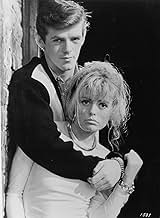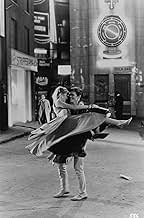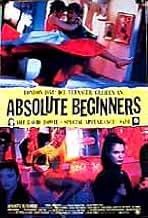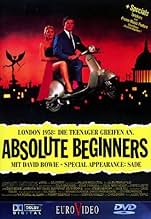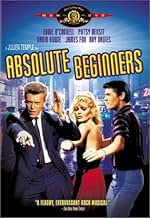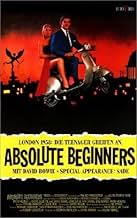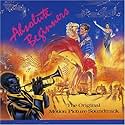PUNTUACIÓN EN IMDb
5,6/10
3,9 mil
TU PUNTUACIÓN
En el Londres de 1958, un joven fotógrafo busca el estrellato mediático para conservar el amor de una bella aspirante a diseñadora de moda.En el Londres de 1958, un joven fotógrafo busca el estrellato mediático para conservar el amor de una bella aspirante a diseñadora de moda.En el Londres de 1958, un joven fotógrafo busca el estrellato mediático para conservar el amor de una bella aspirante a diseñadora de moda.
- Dirección
- Guión
- Reparto principal
Joseph McKenna
- Fabulous Hoplite
- (as Joe McKenna)
Edward Tudor-Pole
- Ed the Ted
- (as Tenpole Tudor)
Reseñas destacadas
With the great era of musicals long past, it was interesting to see how stylized & clever this little "musical" film really was.
The story line was nil, but then great musicals don't need one, anyway. --Not to say that this was a "great musical", but the music WAS pretty good, and the film's use of thoughtful & colorful sets was stunning.
The camera movement, the scene changes, the hypnotic (almost psychedelic) fades, and the simply dazzling use of color, more than made up for the silly dialog and tripey sub-plots.
All in all, a good looking, well-mounted, and (except for the ending) enjoyable experience. The fast pace of the dream-like musical sequences made this a much better film than I had anticipated seeing.
I rated it 9, -mostly for sets, color, music, costumes, & photography.
The story line was nil, but then great musicals don't need one, anyway. --Not to say that this was a "great musical", but the music WAS pretty good, and the film's use of thoughtful & colorful sets was stunning.
The camera movement, the scene changes, the hypnotic (almost psychedelic) fades, and the simply dazzling use of color, more than made up for the silly dialog and tripey sub-plots.
All in all, a good looking, well-mounted, and (except for the ending) enjoyable experience. The fast pace of the dream-like musical sequences made this a much better film than I had anticipated seeing.
I rated it 9, -mostly for sets, color, music, costumes, & photography.
It is often said that the British just can't do film musicals. That even though we're pretty good at theatrical musicals, the cinematic version is, like gridiron football and republicanism, something best left to our cousins across the Atlantic. This prejudice even survived the award of a "Best Picture" Oscar to "Oliver!", and by the mid-eighties the traditional style of film musical was at a pretty low ebb even in America and virtually extinct in Britain. "Absolute Beginners" was therefore something completely unexpected. It was a British musical which owed nothing to Broadway and very little to the sort of pop-and-rock musicals ("Saturday Night Fever", "Fame", "Flashdance", etc.) which Hollywood had started to turn out in the seventies.
The film was also adapted from an unexpected source; the Colin MacInnes book of the same name about youth culture in late 1950s London. I doubt if MacInnes, who died in 1976, ever imagined that his novel would ever be turned into a musical. The story is set in the long hot summer of 1958. (At least, that's how MacInnes describes it, although Met Office records show that the summer of that year was wet and cool). The main character is Colin, a young photographer. In the original novel he was unnamed, but here he is named after his creator, rather oddly given that the book was not intended to be autobiographical. (MacInnes would have been 44 in 1958, a generation older than his character).
Colin falls in love with Crepe Suzette, an aspiring fashion designer, but she gets engaged to her boss Henley of Mayfair, motivated by career advantage rather than love, as Henley is an arrogant and unpleasant individual, old enough to be Suzette's father. In the book, in fact, the compulsively promiscuous Suzette is also not very pleasant, but here her character is very much softened. The film also deals with the Notting Hill race riots, shown here as having been whipped up by a Fascist rabble-rouser, unnamed but clearly based upon Oswald Mosley. The said demagogue is in league with a corrupt property developer who wants to drive the black inhabitants out of Notting Hill, at the time a very run-down area, in order to further one of his redevelopment schemes.
"Absolute Beginners" was panned by the critics and failed at the box-office. Together with the commercial failures of two other films released about the same time, "Revolution" and "The Mission", it led to a decline in the fortunes of Goldcrest, the major British film studio of the eighties. Some even started talking of a crisis in the British film industry, which had produced so many great films in the first half of the decade. The film was also disliked by literary purists who complained that it was not faithful to the original novel, particularly in the rewriting of MacInnes' ending and the bowdlerisation of Crepe Suzette's character.
And yet I loved the film and still do, even though the critics were partly right. Yes, the film has its flaws. Eddie O'Connell makes an uncharismatic hero, and seems too old for the part of Colin, who is supposed to be a teenager. (O'Connell has faded from view since 1986 to such an extent that I have been unable to find his exact date of birth, but he appears to be about thirty). The storyline does not always flow smoothly, perhaps not surprisingly given that it was the first feature film of its director Julien Temple, thitherto better known as the maker of pop videos and a documentary about the Sex Pistols. As for the literary purists, they are certainly right about its lack of fidelity to its literary source, although in its defence I should say that had it not been for this film I should in all probability never have discovered MacInnes' brilliant novel or his other writings.
The acting, like much in the film, is deliberately stylised. (Those who call it wooden are missing the point). The lovely Patsy Kensit makes a delightful heroine as Suzette in what has been described as her breakthrough role. At the time she was hailed as the "British Bardot" and is still a familiar face, even if she has never achieved her much-quoted ambition "to be more famous than anything or anyone".
Despite its faults, "Absolute Beginners" is a cool and stylish movie. It probably has little to do with the fifties as they actually were, but a lot to do with the fifties as they should have been. It has an immense drive and energy with an absolutely irresistible soundtrack. Modern audiences might be surprised that this is largely jazz based, given that we now tend to look back at the late fifties as the birth of the rock-and-roll era. At that time in Britain, however, before the rise of the Beatles, jazz was still very much part of the youth scene, particularly of the "mod" subculture, rock being associated with the mods' rivals, the "rockers". A number of leading musicians, such as David Bowie, Sade and the Style Council contributed to the film. (Bowie also makes an acting contribution as the property developer Vendice Partners).
I have a personal reason why this film is a favourite. It brings back memories a long hot summer- not that of 1958, when I was not even born, but that of 1986. At the time, I was young and in love and went to see the film with my girlfriend. I remember us coming out of the cinema together on a warm summer's evening, exhilarated by what we had just seen, and walking along the London Embankment, laughing and singing Bowie's great theme song to one another. "As long as we're together, all the rest can go to hell- I absolutely love you". With a memory like that, how could I do other than love this film? 8/10
The film was also adapted from an unexpected source; the Colin MacInnes book of the same name about youth culture in late 1950s London. I doubt if MacInnes, who died in 1976, ever imagined that his novel would ever be turned into a musical. The story is set in the long hot summer of 1958. (At least, that's how MacInnes describes it, although Met Office records show that the summer of that year was wet and cool). The main character is Colin, a young photographer. In the original novel he was unnamed, but here he is named after his creator, rather oddly given that the book was not intended to be autobiographical. (MacInnes would have been 44 in 1958, a generation older than his character).
Colin falls in love with Crepe Suzette, an aspiring fashion designer, but she gets engaged to her boss Henley of Mayfair, motivated by career advantage rather than love, as Henley is an arrogant and unpleasant individual, old enough to be Suzette's father. In the book, in fact, the compulsively promiscuous Suzette is also not very pleasant, but here her character is very much softened. The film also deals with the Notting Hill race riots, shown here as having been whipped up by a Fascist rabble-rouser, unnamed but clearly based upon Oswald Mosley. The said demagogue is in league with a corrupt property developer who wants to drive the black inhabitants out of Notting Hill, at the time a very run-down area, in order to further one of his redevelopment schemes.
"Absolute Beginners" was panned by the critics and failed at the box-office. Together with the commercial failures of two other films released about the same time, "Revolution" and "The Mission", it led to a decline in the fortunes of Goldcrest, the major British film studio of the eighties. Some even started talking of a crisis in the British film industry, which had produced so many great films in the first half of the decade. The film was also disliked by literary purists who complained that it was not faithful to the original novel, particularly in the rewriting of MacInnes' ending and the bowdlerisation of Crepe Suzette's character.
And yet I loved the film and still do, even though the critics were partly right. Yes, the film has its flaws. Eddie O'Connell makes an uncharismatic hero, and seems too old for the part of Colin, who is supposed to be a teenager. (O'Connell has faded from view since 1986 to such an extent that I have been unable to find his exact date of birth, but he appears to be about thirty). The storyline does not always flow smoothly, perhaps not surprisingly given that it was the first feature film of its director Julien Temple, thitherto better known as the maker of pop videos and a documentary about the Sex Pistols. As for the literary purists, they are certainly right about its lack of fidelity to its literary source, although in its defence I should say that had it not been for this film I should in all probability never have discovered MacInnes' brilliant novel or his other writings.
The acting, like much in the film, is deliberately stylised. (Those who call it wooden are missing the point). The lovely Patsy Kensit makes a delightful heroine as Suzette in what has been described as her breakthrough role. At the time she was hailed as the "British Bardot" and is still a familiar face, even if she has never achieved her much-quoted ambition "to be more famous than anything or anyone".
Despite its faults, "Absolute Beginners" is a cool and stylish movie. It probably has little to do with the fifties as they actually were, but a lot to do with the fifties as they should have been. It has an immense drive and energy with an absolutely irresistible soundtrack. Modern audiences might be surprised that this is largely jazz based, given that we now tend to look back at the late fifties as the birth of the rock-and-roll era. At that time in Britain, however, before the rise of the Beatles, jazz was still very much part of the youth scene, particularly of the "mod" subculture, rock being associated with the mods' rivals, the "rockers". A number of leading musicians, such as David Bowie, Sade and the Style Council contributed to the film. (Bowie also makes an acting contribution as the property developer Vendice Partners).
I have a personal reason why this film is a favourite. It brings back memories a long hot summer- not that of 1958, when I was not even born, but that of 1986. At the time, I was young and in love and went to see the film with my girlfriend. I remember us coming out of the cinema together on a warm summer's evening, exhilarated by what we had just seen, and walking along the London Embankment, laughing and singing Bowie's great theme song to one another. "As long as we're together, all the rest can go to hell- I absolutely love you". With a memory like that, how could I do other than love this film? 8/10
I had just graduated high school(in California) when this movie came out, in the summer of 1986. Given the heavy promotion given it by MTV(I believe they had a contest whose winner would appear in the film, though I may have remembered that wrong), and given that David Bowie, whose music career was on the upswing, had a starring role(along with a mix of musicians like veteran Ray Davies(of the Kinks) and newcomer Sade), you'd expect the movie would be a hit. Instead, it barely made a dent in America(in their year-end issue, Rolling Stone called it one of the hype jobs of the year), and seems to have been largely forgotten(though in an interview with Rolling Stone about a year later, Bowie claimed it was a cult hit). In fact, while star Patsy Kensit has had an erratic career, Bowie continued to make music and the occasional movie, and director Julien Temple, after this and EARTH GIRLS ARE EASY, went back to his forte, music videos, it's sort of ironic that the most successful person to come from that movie is Robbie Coltrane(TV's CRACKER), who only had a small role here.
Why am I boring you all with this? Because ABSOLUTE BEGINNERS is one of the unsung classics of the 80's. Of course, having grown up on old-time musicals(my dad was a fan), I'm probably more receptive to them than the average person seems to be today, but this is one of the best ones of the last two decades. Not only are all the numbers well-written and well sung(in addition to Bowie, Davies, and Sade, jazz great Gil Evans wrote the instrumental score, and Style Council contributes a song. Also, female lead Patsy Kensit sings one, while male lead Eddie O'Connell lip-syncs his numbers), they're also imaginatively staged. A good example is "Motivation," one of two numbers Bowie sings(the other being the title song), which includes parodies of Busby Berkley-type numbers. There's also a wicked parody of teen pop.
As for the story, Temple has the fine novel to fall back on(by Colin MacInnes), and while there's probably too many ideas trying to burst out(teen alienation, racism, "Selling Out"(the name of another song), he juggles them all with finesse. And the cast handles things with aplomb, with the exception of, surprisingly, Bowie; while he's appropriately super-smooth as the oily executive, his voice(intended to be an American accent?) is annoying. But O'Connell and Kensit are both fresh and appealing, Anita Morris and James Fox both play well in their typecast roles(as, respectively, a sexpot gossip columnist and an effete fashion designer), there's a nice turn by Mandy Rice-Davies(who, you may remember, was in real life involved in the Profumo scandal), and a host of others in small but memorable parts(the ones I can remember are Steven Berkoff(BEVERLY HILLS COP) and Bruce Payne(PASSENGER 57) as fascists, and Paul Rhys(VINCENT AND THEO) as a mod). All in all, well worth tracking down.
Why am I boring you all with this? Because ABSOLUTE BEGINNERS is one of the unsung classics of the 80's. Of course, having grown up on old-time musicals(my dad was a fan), I'm probably more receptive to them than the average person seems to be today, but this is one of the best ones of the last two decades. Not only are all the numbers well-written and well sung(in addition to Bowie, Davies, and Sade, jazz great Gil Evans wrote the instrumental score, and Style Council contributes a song. Also, female lead Patsy Kensit sings one, while male lead Eddie O'Connell lip-syncs his numbers), they're also imaginatively staged. A good example is "Motivation," one of two numbers Bowie sings(the other being the title song), which includes parodies of Busby Berkley-type numbers. There's also a wicked parody of teen pop.
As for the story, Temple has the fine novel to fall back on(by Colin MacInnes), and while there's probably too many ideas trying to burst out(teen alienation, racism, "Selling Out"(the name of another song), he juggles them all with finesse. And the cast handles things with aplomb, with the exception of, surprisingly, Bowie; while he's appropriately super-smooth as the oily executive, his voice(intended to be an American accent?) is annoying. But O'Connell and Kensit are both fresh and appealing, Anita Morris and James Fox both play well in their typecast roles(as, respectively, a sexpot gossip columnist and an effete fashion designer), there's a nice turn by Mandy Rice-Davies(who, you may remember, was in real life involved in the Profumo scandal), and a host of others in small but memorable parts(the ones I can remember are Steven Berkoff(BEVERLY HILLS COP) and Bruce Payne(PASSENGER 57) as fascists, and Paul Rhys(VINCENT AND THEO) as a mod). All in all, well worth tracking down.
when you remove aliens and flying space ships from battlefield earth and put god awful music scores and terrible acting in it what do you have? a stupid musical that stars david bowie and some other actors in it that do a terrible job of acting stupid and crummy in a musical that should have been called absolute bummed out.
First, I must respectfully disagree with the other reviewer who hated this movie. It has a complex set of plot lines that deal with a number of issues revolving around the lives of a young up-and-coming "pop photographer", and his love interest -- played by Patsy Kensit. Then, there is the "old queen" (also an unscrupulous real estate developer) who marries Patsy. Now, add to that the ad agency aspect (David Bowie's song and dance routine to "Selling Out" is a classic), plus the racial tensions in 1950's or 1960's London, and you have a multi-layered plot tapestry.
Personally, I don't mind that David Bowie is only in the movie for ten minutes -- I am a fan of Bowie, but this is really not "his movie".
Personally, I don't mind that David Bowie is only in the movie for ten minutes -- I am a fan of Bowie, but this is really not "his movie".
¿Sabías que...?
- CuriosidadesThe character of "Harry Charms" was based on a real-life British manager and impresario of the period, Larry Parnes, who was famous for hiring unknown singers and giving them extravagant stage names (his most famous client was Billy Fury). In 1960 he hired an unknown Liverpool band called The Beatles to accompany one of his lesser stars, Johnny Gentle, on a tour of Scotland, but he decided not to take the Beatles on as clients because he was only interested in handling solo singers, not groups.
- PifiasDuring the riot scenes, in one shot a double decker bus is on fire. In the next shot, it isn't burning. In the next shot, it is. (During the T.V. announcers speak to the viewing public about the 'race riots').
- ConexionesEdited into Ray Davies: Quiet Life (1986)
- Banda sonoraSanta Lucia
Performed and composed by Ekow Abban
Selecciones populares
Inicia sesión para calificar y añadir a tu lista para recibir recomendaciones personalizadas
- How long is Absolute Beginners?Con tecnología de Alexa
Detalles
- Fecha de lanzamiento
- País de origen
- Idioma
- Títulos en diferentes países
- Absolute Beginners
- Localizaciones del rodaje
- Empresas productoras
- Ver más compañías en los créditos en IMDbPro
Taquilla
- Recaudación en Estados Unidos y Canadá
- 930.211 US$
- Fin de semana de estreno en EE. UU. y Canadá
- 83.743 US$
- 20 abr 1986
- Recaudación en todo el mundo
- 930.211 US$
- Duración
- 1h 48min(108 min)
- Color
- Relación de aspecto
- 2.35 : 1
Contribuir a esta página
Sugerir un cambio o añadir el contenido que falta


